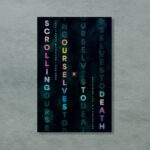I was reminded of T. S. Eliot as I watched Denis Villeneuve’s new film, Arrival. Specifically, the passages in “Little Gidding” that describe the circularity of an existence full of often overlapping departures and arrivals:
What we call the beginning is often the end
And to make an end is to make a beginning.
The end is where we start from.
Or this:
We shall not cease from exploration
And the end of all our exploring
Will be to arrive where we started
And know the place for the first time.
Eliot and artists like him put words to an ineffable feeling, an idea that haunts us modern creatures: that we’re eternal beings in a time-bound world. Little ruptures are everywhere: the strange way that joy is so closely related to impermanence and longing; the mysteries of memory, imagination, and dreaming; the oddity of deja vu; the prophetic gifts that Christians chalk up to the Holy Spirit and secularists dismiss as uncanny intuition or Darwinian instinct adaptation.
Christians have language for this, obviously, because we believe in the supernatural and in the everlasting reality of the human soul. But what do unbelievers make of this sense that there is something bigger and beyond human finitude? How do they grapple with the pesky resonance of the idea, articulated by C. S. Lewis, that “if we find ourselves with a desire that nothing in this world can satisfy, the most probable explanation is that we were made for another world”?
Liturgy of Sci-Fi
The transcendent, often sublime frontiers of art and science are but one way moderns deal with these questions. So it should be no surprise that science fiction as a genre (bringing art and science together) is often the place where the metaphysical longings and liturgies of secular “faith” find their home. Christopher Nolan’s Interstellar (2014), with its organ-heavy soundtrack and “cathedral of space” visuals, is a good example. The 1997 adaptation of Carl Sagan’s Contact is another.
Science fiction (bringing art and science together) is often the place where the metaphysical longings and liturgies of secular ‘faith’ find their home.
Arrival is yet another example, as it’s a film that uses an alien encounter on earth to probe deeper questions about faith, time, suffering, and love.
French Canadian director Denis Villeneuve (Prisoners, Sicario) has a reputation for artfully yet subtly exploring moral questions in his ambitious films, and he does it again with this one. Arrival tells the story of a linguist (Amy Adams) who partners with a theoretical physicist (Jeremy Renner) to help the government communicate with aliens when their skyscraper-sized “shells” suddenly show up in 12 locations around the world.
Questions for the Calvinist

*spoilers below*
The film’s “plot twist” is less like a Sixth Sense-style 180-degree turn and more like a slow unveiling that becomes more glorious the closer it comes into view. You can see it coming from early on, so the effect is less in its surprise than in the questions it raises and emotions it stirs.
To be sure, Villeneuve’s film raises many questions, on everything from geopolitics to the nature of time to the sanctity of life. Perhaps I’m not surprised that, as a Calvinist, I was most compelled by the questions Arrival poses about foreknowledge and free will. As the characters in the film come to find out, “time” isn’t what they understood it to be. The future, the past, and the present are all the same from a certain eternal point of view. In this case, who has this eternal perspective? The creatures from “heaven” with 7 legs and 12 vessels. Does anyone else recognize these numbers?
This view complicates our notions of free will, of course. Can reality be causal and predetermined at the same time? What would it mean if we could see visions of not just a possible future but our specific future? Would the choices that get us there be any less significant? Would the “gift” of seeing the future be a blessing or a curse? How could a brain that grasps the eternal picture—an all-at-the-same-time awareness—not go insane in a time-bound world? As we approach Advent and dwell on the incarnation of Jesus Christ, we might ponder whether he felt any tension in his own eternal mind as it moved forward in temporal space.
The questions could go on and on, but I’ll leave the philosophers and theologians to further probe them. Arrival is certainly primo material for the next “film and philosophy” textbook.
More Emotional than Cerebral
For me the real effect of Arrival wasn’t cerebral but emotional. I was surprised at how moved I was by the film’s final 15 minutes, as the bittersweet realities of the plot began to sink in. I felt overwhelmed by the kindness of God, that in his infinite bigness and unfathomable grandeur he still cares for each of us: for the linguist, the scientist, the trigger-happy Chinese general, and everyone in between. He cares for us in our suffering and in our joy. He cares for us in ways our finite minds can’t fathom.
Arrival is one of those movies when, upon finishing it, you think to yourself, Ah, I thought it was about this but really it’s about this. It juxtaposes the cosmic and the intimate, suggesting that some benevolent force from beyond would go to great lengths to rescue earthlings from themselves, even coming down to earth and taking up residence among us for a while. Sound familiar?
There are no “Christ figures” in Arrival. But certainly there’s Christlikeness. Consider Amy Adams’s character, for example: a woman who chooses to pursue love and sacrifice even though she can see the pain that lies ahead. Surely this is a dim picture of the agony Jesus knew: seeing in advance the suffering he would endure, but choosing it anyway “for the joy set before him” (Heb. 12:2).
Arrival is a perfect film for Advent, the season when we contemplate the mystery of an eternal God taking on temporal form “in the fullness of time” (Gal. 4:4). It’s a film that helps us approach the incarnation with fresh insight and appreciation, an invitation to revisit a familiar story and consider again the mysteries the Word becoming flesh and dwelling among us, a beckoning to go back to Bethlehem and see it with fresh eyes. Who knows? Perhaps, in the words of Eliot, “to arrive where we started / and know the place for the first time.”
“The Most Practical and Engaging Book on Christian Living Apart from the Bible”
 “If you’re going to read just one book on Christian living and how the gospel can be applied in your life, let this be your book.”—Elisa dos Santos, Amazon reviewer.
“If you’re going to read just one book on Christian living and how the gospel can be applied in your life, let this be your book.”—Elisa dos Santos, Amazon reviewer.
In this book, seasoned church planter Jeff Vanderstelt argues that you need to become “gospel fluent”—to think about your life through the truth of the gospel and rehearse it to yourself and others.
We’re delighted to offer the Gospel Fluency: Speaking the Truths of Jesus into the Everyday Stuff of Life ebook (Crossway) to you for FREE today. Click this link to get instant access to a resource that will help you apply the gospel more confidently to every area of your life.

































